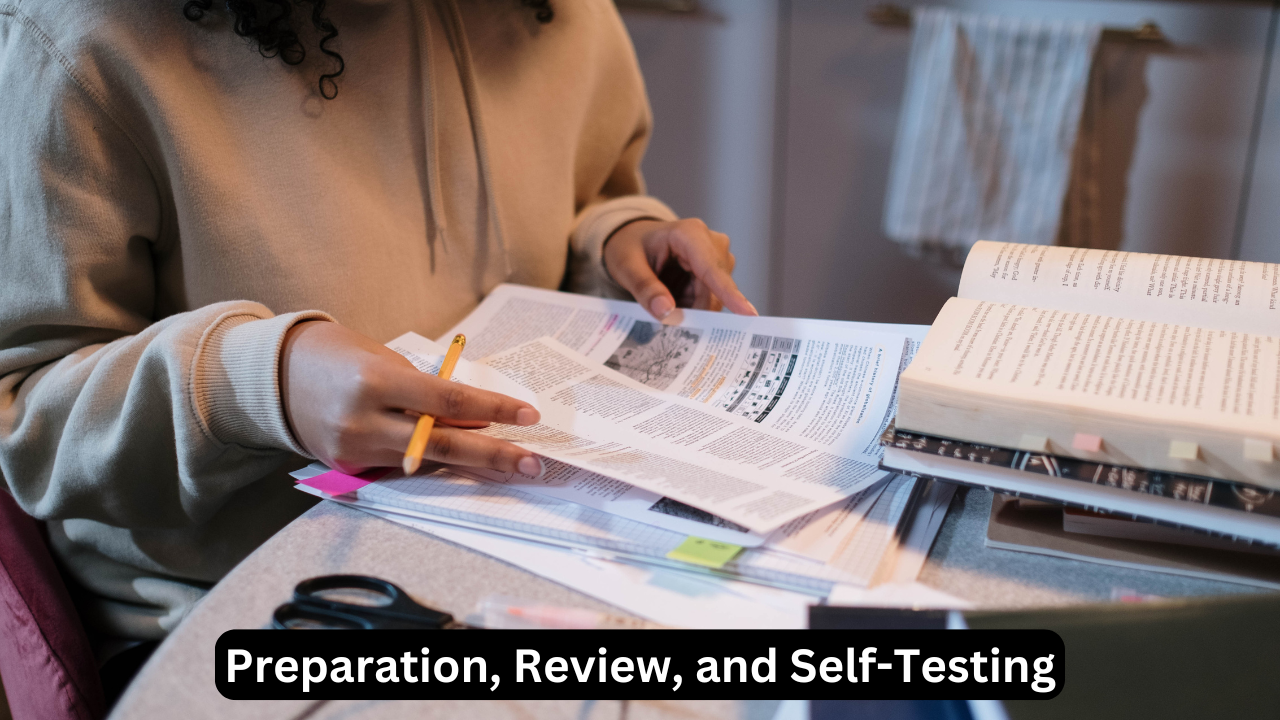To effectively study plan for exams, follow a 7-day structured plan that combines active preparation, consistent review, and self-testing to ensure thorough understanding and long-term retention.
Exam season can be overwhelming, but with a 7-day structured study plan, you can prepare effectively without the need for cramming. This article will guide you on how to create and execute a productive seven-day study plan to maximize your chances of success. By dividing your syllabus into manageable chunks and combining preparation with review, you’ll stay organized and retain information more effectively.
Why a 7-Day Study Plan Works
A 7-day study plan is a powerful way to manage your exam preparation. Instead of waiting until the last minute and cramming, this method spreads out your study time, allowing you to digest the material at a manageable pace. By incorporating active learning, self-testing, and regular review, you not only reinforce what you’ve learned but also keep your stress levels under control. This approach gives you a clear structure, ensures better information retention, and ultimately leads to better performance when exam day arrives.
Key Benefits:
- Clear, Organized Structure
With a 7-day plan, you know exactly what to focus on each day, eliminating any guesswork and making your study sessions more productive. - Enhanced Learning through Repetition
Regular reviews help reinforce your understanding and ensure that key concepts stay fresh in your mind. You’ll be able to recall information more easily when needed. - Reduced Stress and Anxiety
By avoiding cramming and spreading out your study time, you’ll feel more relaxed and in control, leading to a calmer and more focused exam day. - Improved Retention with Spaced Repetition
Revisiting material at spaced intervals helps strengthen your long-term memory. This method ensures the information sticks, even after you’ve moved on to other topics. - Better Focus and Productivity
A 7-day study plan breaks your study time into manageable chunks, which helps you stay focused during each session, ultimately increasing your productivity.
By following this plan, you don’t just prepare for the exam—you set yourself up for success with a well-structured, stress-free approach to studying.
7-Day Study Plan for Exam Preparation
Day 1: Analyze the Syllabus and Prepare Study Material

The first day is all about getting organized. Begin by breaking the syllabus into seven chunks based on chapters, topics, or lecture groups. Prioritize topics that carry more weight in the exam.
What to Do:
- Divide the material into sections like Chunk A, B, C, etc.
- Create summaries, flashcards, or concept maps for Chunk A.
- Predict possible exam questions for this chunk.
Example of Chunking:
| Chunk | Topics |
|---|---|
| Chunk A | Chapters 1-2 |
| Chunk B | Chapters 3-4 |
| Chunk C | Chapters 5-6 |
| Chunk D | Chapters 7-8 |
| Chunk E | Chapters 9-10 |
| Chunk F | Revision Topics 1-2 |
| Chunk G | Comprehensive Review |
Day 2: Active Preparation and Beginning Review
Dedicate two hours to preparing Chunk B and another 30 minutes reviewing Chunk A. Use active learning techniques, such as making flowcharts or creating quizzes.
Study Tips:
- Highlight key points while preparing summaries.
- Test your memory by reciting topics from Chunk A without looking at your notes.
- Solve a few practice questions for immediate application of knowledge.
Day 3: Preparation and Reinforcement
Continue by preparing Chunk C for 1.5 hours and spending 45 minutes reviewing Chunks A and B. This keeps older material fresh while you add new content.
| Task | Time Allocated |
|---|---|
| Prepare Chunk C | 1.5 hours |
| Review Chunk B | 30 minutes |
| Review Chunk A | 15 minutes |
Review Methods:
- Use flashcards to quiz yourself on previous chunks.
- Discuss difficult topics with a study partner to clarify concepts.
Day 4: Preparing Chunk D and Midway Review
Spend one hour preparing Chunk D and the remaining time reviewing Chunks A, B, and C. Begin integrating self-testing for older material to simulate the exam environment.
What to Focus On:
- Create a detailed study guide for Chunk D.
- Identify weak areas in Chunks A-C and work on them during the review sessions.
Sample Day Plan:
| Activity | Time |
|---|---|
| Prepare Chunk D | 1 hour |
| Review Chunk C | 25 minutes |
| Review Chunk B | 15 minutes |
| Review Chunk A | 10 minutes |
Day 5: Preparation, Review, and Self-Testing

Prepare Chunk E for 1.5 hours, followed by a comprehensive review of all chunks. Dedicate at least 45 minutes to self-testing using practice exams or questions.
Self-Testing Tips:
- Simulate real exam conditions: timed tests without interruptions.
- Review your answers and revisit weak areas.
Day 6: Focused Review and Integration
Day 6 is dedicated to consolidating what you’ve learned. Spend time reviewing all chunks briefly, focusing on your weakest areas.
Key Activities:
- Summarize each chunk in a single sentence to test overall understanding.
- Practice writing essays or solving problems related to exam topics.
- Create a final revision checklist for all important concepts.
| Review Task | Time Allocated |
|---|---|
| Review All Chunks Briefly | 1.5 hours |
| Focused Weak Areas | 1 hour |
Day 7: Final Review and Confidence Building
Day 7 is all about reinforcing your learning and walking into the exam room with confidence. This is not the time to cram more information into your brain. Instead, focus on a light review of key concepts, ensuring that everything you’ve studied sticks.
Activities for Day 7:
- Quick Review Sessions: Spend 30 minutes on each section, revisiting the core concepts that are most important for the exam. Keep it brief and focused.
- Practice Test under Exam Conditions: Simulate exam conditions by taking a final practice test. Time yourself and work in a quiet environment to mimic the real thing.
- Flashcards & Summaries: Go through your flashcards or summary notes to reinforce essential points. This quick refresh helps keep your memory sharp.
Pro Tip:
Take it easy today—don’t overload your brain with new information. Make sure to rest, stay hydrated, and keep a positive mindset. Confidence is key, so trust in the hard work you’ve put in throughout the week.
On Day 7, your goal is to stay relaxed and calm. You’ve already done the hard work, now it’s about staying focused and walking into the exam room with the confidence to succeed.
Key Study Techniques for Success

1. Active Preparation
Actively engage with your material by creating something new, like flashcards or concept maps. Passive reading or note-taking is less effective.
2. Spaced Repetition
Revisit older topics every day to reinforce learning. Spaced repetition is scientifically proven to improve long-term memory retention.
3. Self-Testing
Quizzing yourself mimics the exam environment, helping you identify knowledge gaps. Use blank-page testing, practice questions, or mock exams.
4. Teaching Others
Explain concepts to a friend or family member. This deepens understanding and highlights any unclear areas.
Common Problems and Solutions
1. Lack of Time
- Solution: Prioritize high-weightage topics and focus on active learning.
2. Difficulty Remembering Topics
- Solution: Use spaced repetition and quiz yourself daily.
3. Anxiety or Lack of Motivation
- Solution: Break study sessions into smaller blocks (e.g., 25-minute Pomodoro Technique). Celebrate small wins to stay motivated.
FAQs About Study Plan for Exams
1. Can I really prepare for exams in 7 days?
Yes, if you follow a structured plan, focus on active learning, and review consistently.
2. How many hours should I study each day?
Aim for 3-4 focused hours daily, split into preparation and review sessions.
3. Should I study multiple topics in one day?
Yes. Switching between topics improves retention and prevents boredom.
4. Is cramming ever effective?
Cramming is rarely effective for long-term retention. Instead, focus on daily review and self-testing.
5. How do I handle tough topics?
Spend more time on challenging areas and seek help from teachers or peers.
6. What’s the best way to self-test?
Use flashcards, practice exams, or write summaries without looking at notes.
7. How can I stay focused while studying?
Eliminate distractions, take short breaks, and maintain a clean, organized study space.
Conclusion
Studying for exams in 7 days is achievable with the right plan, discipline, and techniques. By dividing your syllabus into chunks, incorporating active preparation and spaced review, and regularly self-testing, you can prepare thoroughly without overwhelming yourself. Follow this plan, stay consistent, and maintain a positive attitude to ace your exams with confidence.
Start today and transform your exam preparation process into a stress-free and successful journey! Please follow our blog Educationewz.



